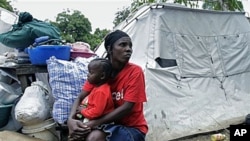Haiti is holding observances ahead of the one-year anniversary of the devastating earthquake that shook the country, leaving more than 200,000 people dead, 1 million others homeless and widespread destruction.
On Tuesday, President Rene Preval presided over a ceremony on the outskirts of the capital, Port-au-Prince, at a mass grave where tens of thousands of quake victims are buried. Mr. Preval was joined by other officials and by his wife as they paid their respects to the dead.
The powerful, 7.0-magnitude earthquake struck the impoverished Caribbean nation just before 5 p.m. local time on Tuesday, January 12, 2010. The quake - the most powerful to strike Haiti in more than 200 years - left much of the capital and surrounding areas in ruins and people buried under tons of rubble.
The presidential palace and the headquarters of the United Nations peacekeeping mission in Haiti were among the buildings that collapsed in the quake. More than 100 members of the U.N. mission were killed, including the mission chief, Hedi Annabi, and his deputy, Luiz Carlos da Costa.
On Wednesday, the first anniversary of the quake, U.N. Secretary-General Ban Ki-moon is expected to take part in a wreath-laying ceremony in the U.N. lobby. A 47-second period of silence also is scheduled to mark the duration of the earthquake.
Secretary-General Ban said through a spokesperson Tuesday that the earthquake was "a disaster of unparalleled magnitude," and he called for efforts to help survivors to be redoubled and renewed.
The quake was centered about 16 kilometers from the Haitian capital and struck at a depth of just 10 kilometers. It was followed by several aftershocks, one of which had a magnitude of 5.9. The quake knocked out communications across the capital, making it difficult to get accurate details regarding casualties and damage. Some residents, however, used social media such as Twitter and Facebook to send pictures of the devastation to news organizations.
In the days that followed, the United States launched a major civilian and military response to the quake. Other countries also provided relief to the Western Hemisphere's poorest country, as did aid agencies.
Celebrities from the entertainment industry, sports, media and politics joined forces for a two-hour, multi-network telethon to raise money for victims. The commercial-free program, "Hope for Haiti Now," aired on the U.S. music television network, MTV, and several other cable and broadcast stations.
U.S. Secretary of State Hillary Clinton visited Haiti in the days after the quake, as did her husband, former U.S. President Bill Clinton. Mr. Clinton later returned to Haiti in March with former President George W. Bush, after both of them established a fund to raise money for quake victims.
Billions of dollars also were pledged to help Haiti at a March donors conference, but reports say only a fraction of the money has been delivered. Mr. Clinton, who was visiting Haiti Tuesday, has voiced frustration at the slow pace of reconstruction in the year since the quake. Mr. Clinton also serves as the United Nations special envoy for Haiti.
On Tuesday, the United Nations humanitarian coordinator for Haiti said he hopes most of the earthquake victims still living in tent camps can move to more secure housing by the end of this year.
In a conference call, Nigel Fisher said that, optimistically, the number of displaced people in the camps could be reduced by about 75 percent - from its current level of 800,000 to about 200,000 - within the year. But he stressed that is still a lot of people.
Hundreds of thousands of people already have left the camps since the earthquake destroyed homes, leaving much of Port-au-Prince in rubble. The U.N. says of the 700,000 who have moved elsewhere, about 100,000 have been relocated into 31,000 transitional shelters built since the disaster - 1,000 shelters ahead of the target.
Along with the quake recovery, Haiti is dealing with a cholera epidemic that has left more than 3,600 people dead and infected about 170,000. More cases are expected.
Haiti Mourns Earthquake Dead ahead of 1st Anniversary













